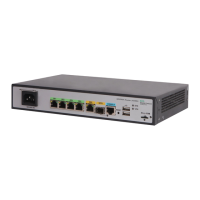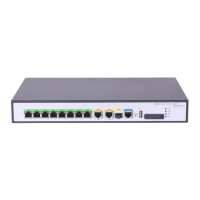322
Instance
Instance number of the process. Whether a process can run multiple instances
depends on the software implementation.
Respawn
Indicates whether the process restarts when an error occurs:
• ON—The process automatically restarts.
• OFF—The process does not automatically restarts.
Respawn count Times that the process has restarted. The starting value is 1.
Max. spawns per minute
Maximum number of times that the process can restart within one minute. If the
threshold is reached, the system automatically shuts down the process.
Last started Time when the latest restart occurred.
Process state
State of the process:
• running—Running or waiting in the queue.
• sleeping—Interruptible sleep.
• traced or stopped—Stopped.
• uninterruptible sleep—Uninterruptible sleep.
• zombie—The process has quit, but some resources are not released.
Max. core
Maximum number of core files that the process can create. 0 indicates that the
process never creates a core file. A process creates a core file after it
abnormally restarts. If the number of core files reaches the maximum value, no
more core files are created. Core files are helpful for troubleshooting.
ARGS
Parameters carried by the process during startup. If the process carries no
parameters, this field displays a hyphen (-).
TID Thread ID.
LAST_CPU Number of the CPU on which the process is last scheduled.
Stack Stack size.
PRI Thread priority.
State
Thread state:
• R—Running.
• S—Sleeping.
• T—Traced or stopped.
• D—Uninterruptible sleep.
• Z—Zombie.
HH:MM:SS:MSEC Running time since the latest start.
Name Process name.
# Display state information for all processes.
<Sysname> display process all
JID PID %CPU %MEM STAT PRI TTY HH:MM:SS COMMAND
1 1 0.0 0.0 S 120 - 00:00:04 scmd
2 2 0.0 0.0 S 115 - 00:00:00 [kthreadd]
3 3 0.0 0.0 S 99 - 00:00:00 [migration/0]
4 4 0.0 0.0 S 115 - 00:00:05 [ksoftirqd/0]
5 5 0.0 0.0 S 99 - 00:00:00 [watchdog/0]
6 6 0.0 0.0 S 115 - 00:00:00 [events/0]
7 7 0.0 0.0 S 115 - 00:00:00 [khelper]
